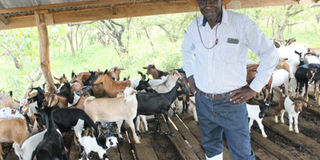Civil engineer finds calling in goat rearing

When his family entrusted him with the responsibility to manage over 100 hectares of family land in Omel Apem in Gulu District, Moses Onono discovered his true passion. The civil engineer who was assigned the role of caretaker following the death of his father, quit his job with an international firm to pursue farming. Onono started small by planting trees then later incorporated piggery and cattle keeping. He picked interest in goat rearing after a team from Avis, a non-governmental organisation, visited his farm and advised him to try out goat rearing. They recommended that he crossbreeds East African Small Goats with the Boer Breeds from South Africa to improve on the size and weight.
Inspiration
“Avis was majorly looking at training the youth in Agri Skill to fight the unemployment problem, and I was impressed with their projections about goat rearing,” he shares.
He got part of his savings and bought 50 female East African Small goats and two male Boer breeds from western Uganda. “I had Shs17m so I used it to buy the goats as well as construct a modern fenced farm,” he says. Currently, he has 80 goats, the number would be higher but he keeps on selling them. “I discovered that a cross breed of Boer and East African Small Goat weighs 25-30kg unlike the local breeds which weigh between 10-15kg. On local market, the East African Small Goats are sold between Shs50,000 and Shs120,000 while the cross breed are sold between Shs180,000 and Shs250,000 which is a good deal for a farmers like me,” says Onono.
Feeding
Onono says his goats feed on the green natural grass in a control area within a wire fence to control their movement. “I am not buying any feeds for my goats because I have enough land to graze my goats with good quality natural grass in my farms,” he says.
His goats are released for grazing from 3pm to 6pm because they believe grazing for at least two hours is enough for a day, and they drink water too.
Labour
To the cut the labour costs, Onono has turned his farm into a training centre for youth which has attracted people in his village as well as neighbouring towns. This has enabled him to teach other people while at the same time tending to his goats. “Very many youth who undergo these trainings are doing well and replicate the best practices on our farm to their places, he shares.
Lessons learnt
Onono shares that over time, he has built a relationship with the animals that are under his care.
“Every living thing understands that is why I put salt in my hands for the goats to eat each time they are coming out and going in, to cultivate routine as well as a relationship.”
He says eating salt from the hand is a symbol of greeting to make the animals know that he is not harmful to them.
Goats can damage fences, so make sure you construct a strong one. You can choose from a variety of options, such as electric, woven wire, welded wire, or cattle panels, but it should be at least four feet high, and tight enough so that they cannot push it down. Goats can jump higher than you think when they can get a running start, and they also have a tendency to push on a fence, especially when they see you coming with treats.
Advice to other farmers
Onono says it is important to slash the grazing land to make it clean and neat. “Maintaining the natural trees on your farm for control soil erosion and above all maintain the natural beauty of the landscape on your farm,” Onono says.
“They should keep trees in the grazing land to help provide shade to the animals and also help to control soil erosion in the grazing land to keep the land green always,” he shares.
Benefits
Onono says although he is no longer occupied withdesign, construction and maintenance works, his goats give him all the satisfaction he desires.
He has also become a consultant farmer whom different farmer groups consult at a fee on modern methods of goat rearing. He charges Shs50,000 for groups and Shs10,000 per individual. “This is helping us reach our goal of improving on the quality of goats in Acholi sub-region,” he says.
Onono sells the new goat breeds between Shs180, 000 and Shs250, 000, making an average of Shs18m as profit.
He says this project has helped him start his other projects such as tree planting, poultry, cattle keeping and piggery as well.
Challenges
Onono says goats are stubborn and can eat just about every plant on a farm. He says to avoid conflict, there is need to fence off the farm.
He says during the dry season, getting grass is difficult, which requires buying or moving to other towns to get pasture to feed them.
Feeding
Forage is very important. If they have eaten down their yard, try and let them out to browse at least once a day and throw them weeds and trimmings from your yard work. My children have a great time bringing treats to the goats: leaves, weeds, dandelions. Make sure you know your yard too....goats love to eat, but they should not eat everything, as some things are poisonous to them. Most of the time they will avoid those things that will make them sick, but not always, especially if forage is hard to come by.
The only other thing you will need to provide for your goats is loose minerals. They need their vitamins just like us!
Hoof trimming
Goat’s hooves are like fingernails that need to be trimmed. Invest in a good pair of trimmers that are sharp. Keeping their hooves in good shape is very important and isn’t a job to be ignored.




